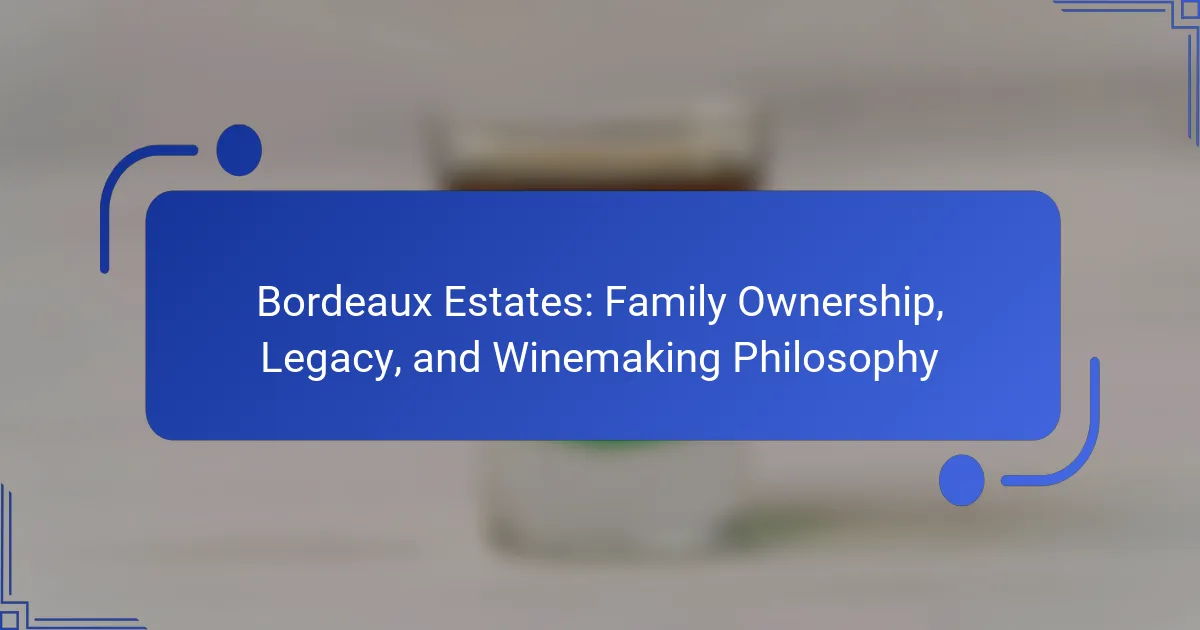
What are Bordeaux Estates and their significance in winemaking?
Bordeaux Estates are vineyards and wineries located in the Bordeaux region of France. They are renowned for producing some of the finest wines in the world. These estates often have a rich history and are typically family-owned, contributing to a legacy of winemaking excellence. Bordeaux Estates are significant because they embody traditional winemaking practices and unique terroirs. The region’s diverse climate and soil types allow for a variety of grape cultivation. Bordeaux Estates produce high-quality wines that are often classified in the Bordeaux wine classification system. This classification system includes prestigious categories like Grand Cru and Premier Cru. The reputation of Bordeaux wines has a substantial impact on global wine markets. Bordeaux Estates are also key players in wine tourism, attracting enthusiasts and collectors.
How is family ownership integral to Bordeaux Estates?
Family ownership is integral to Bordeaux Estates as it ensures continuity in winemaking traditions. This ownership model fosters a deep connection to the land and its heritage. Families often pass down knowledge and practices through generations. Such continuity helps maintain the quality and distinctiveness of Bordeaux wines. Family-owned estates typically prioritize long-term goals over short-term profits. This focus on legacy enhances the reputation of Bordeaux as a premier wine region. Additionally, family involvement often leads to a commitment to sustainable practices. Many Bordeaux families invest in environmentally friendly farming techniques, further enriching the estate’s legacy.
What are the historical roots of family ownership in Bordeaux Estates?
Family ownership in Bordeaux Estates dates back to the medieval period. Many vineyards were established by noble families in the 13th century. These families often passed down their estates through generations. The tradition of family ownership was solidified by the Bordeaux Wine Official Classification of 1855. This classification recognized and ranked châteaux, many of which remain family-owned today. Notable families, such as the Rothschilds and the Lurtons, have deep historical ties to their estates. Their commitment to winemaking has shaped Bordeaux’s reputation over centuries. The continuity of family ownership has fostered a strong sense of legacy and tradition in Bordeaux wine production.
How does family ownership influence the winemaking process?
Family ownership significantly influences the winemaking process by fostering a long-term commitment to quality and tradition. Family-owned wineries often prioritize heritage and craftsmanship over short-term profits. This dedication leads to meticulous vineyard management and careful selection of grape varieties. Families tend to invest in sustainable practices, ensuring the land is preserved for future generations. Moreover, family ownership allows for personal involvement in decision-making, resulting in unique winemaking philosophies. Historical knowledge passed down through generations enhances the understanding of terroir, which is crucial in Bordeaux. This deep-rooted connection to the land often translates into distinctive flavor profiles in the wines produced.
What legacy do Bordeaux Estates hold in the wine industry?
Bordeaux Estates hold a significant legacy in the wine industry as pioneers of fine wine production. They are renowned for their exceptional quality and unique terroir. The region’s classification system, established in 1855, set a benchmark for wine quality globally. Bordeaux Estates have produced some of the world’s most sought-after wines, such as Château Margaux and Château Lafite Rothschild. Their influence extends to winemaking practices, emphasizing tradition and innovation. Bordeaux wines often embody a blend of grape varieties, enhancing complexity and flavor. The estates also contribute to the cultural heritage of winemaking, attracting tourism and investment. Overall, their legacy shapes both the historical and contemporary landscape of the global wine industry.
What are the key milestones in the legacy of Bordeaux Estates?
Bordeaux Estates has several key milestones in its legacy. The establishment of Bordeaux Estates dates back to the 18th century. In 1855, the Bordeaux classification system was created, solidifying the region’s reputation. The introduction of modern winemaking techniques occurred in the late 20th century. In 2000, Bordeaux Estates expanded its global reach through international partnerships. The 2010 vintage was recognized for exceptional quality, marking a significant achievement. In 2015, Bordeaux Estates celebrated its 250th anniversary, highlighting its longstanding heritage. Each milestone reflects the evolution and enduring significance of Bordeaux Estates in the wine industry.
How does the legacy affect the reputation of Bordeaux wines?
The legacy of Bordeaux wines significantly enhances their reputation. Bordeaux has a long history of winemaking, dating back to Roman times. This historical foundation establishes a sense of authenticity and quality. Many Bordeaux estates are family-owned, passing down knowledge and techniques through generations. This continuity fosters a commitment to excellence and tradition. The legacy also includes prestigious classifications, such as the 1855 Classification, which further elevates the status of these wines. Additionally, renowned Bordeaux producers, like Château Margaux and Château Lafite Rothschild, have built strong brand identities over centuries. Their legacies contribute to consumer trust and desirability, reinforcing Bordeaux’s global reputation for premium wines.
What is the winemaking philosophy of Bordeaux Estates?
Bordeaux Estates focuses on a winemaking philosophy that emphasizes tradition and terroir. They prioritize the unique characteristics of their vineyards. Sustainable practices are integral to their approach. This includes organic farming and minimal intervention in the winemaking process. Bordeaux Estates aims to express the true essence of the Bordeaux region in their wines. Each vintage reflects the specific climatic conditions and soil attributes. The estates often blend various grape varieties to achieve balance and complexity. This philosophy has been honed over generations, ensuring quality and consistency in their wines.
How do traditional techniques play a role in Bordeaux Estates’ philosophy?
Traditional techniques are central to Bordeaux Estates’ winemaking philosophy. These methods emphasize craftsmanship and respect for the land. Bordeaux Estates often utilizes hand-harvesting to ensure grape quality. Fermentation in oak barrels is a common practice, enhancing flavor complexity. The estates also prioritize traditional blending techniques to achieve balanced wines. This adherence to tradition reflects a commitment to legacy and quality. Historical practices have been passed down through generations, preserving the unique character of Bordeaux wines. The result is a distinctive style that honors the region’s heritage.
What modern innovations are incorporated into Bordeaux Estates’ winemaking?
Bordeaux Estates incorporates several modern innovations into its winemaking process. These include precision viticulture techniques that utilize satellite imagery and sensor technology. This technology helps monitor vineyard conditions and optimize grape quality. Additionally, Bordeaux Estates employs temperature-controlled fermentation to enhance flavor profiles. They also use advanced filtration systems to ensure wine purity. Another innovation is the use of automated harvesting equipment, which increases efficiency. These methods reflect a commitment to quality and sustainability in winemaking.
How do Bordeaux Estates maintain quality and authenticity?
Bordeaux Estates maintain quality and authenticity through stringent vineyard management and traditional winemaking practices. They prioritize sustainable agriculture to ensure the health of the vines. Many estates employ hand-harvesting techniques to select only the best grapes. This meticulous selection process enhances the overall quality of the wine produced. Bordeaux Estates also adhere to strict regulations set by the Appellation d’Origine Contrôlée (AOC) system. This system enforces standards for grape varieties, yield limits, and aging processes. Additionally, family ownership often leads to a commitment to legacy and craftsmanship. Many estates have been passed down through generations, fostering a deep connection to their land and tradition. This dedication to heritage ensures that the wines reflect the unique terroir of Bordeaux.
What practices ensure the preservation of terroir in Bordeaux Estates?
Bordeaux Estates preserve terroir through sustainable viticulture, soil management, and traditional winemaking techniques. Sustainable viticulture minimizes chemical inputs, promoting biodiversity and soil health. Soil management practices include cover cropping and minimal tillage, which enhance soil structure and nutrient retention. Traditional winemaking techniques respect local grape varieties and fermentation processes, reflecting the unique characteristics of the terroir. These practices maintain the distinctiveness of Bordeaux wines. Research indicates that these methods contribute to the quality and authenticity of the wines produced in the region.
How do Bordeaux Estates adapt to changing market demands while maintaining authenticity?
Bordeaux Estates adapt to changing market demands while maintaining authenticity through innovative practices and sustainable methods. They implement modern technologies in viticulture and winemaking to enhance quality. Many estates focus on organic and biodynamic farming to appeal to health-conscious consumers. Bordeaux Estates also engage in direct-to-consumer sales, increasing accessibility to their wines. They maintain traditional winemaking techniques to preserve their heritage and authenticity. This balance helps them respond to market trends without compromising their identity. Historical examples include the increase in Merlot production in response to consumer preferences in the 1990s. The region’s commitment to quality ensures that adaptations do not dilute the essence of Bordeaux wines.
What challenges do Bordeaux Estates face in today’s wine market?
Bordeaux Estates face several challenges in today’s wine market. Increased competition from global wine producers affects their market share. Changing consumer preferences lean towards organic and sustainable wines, pressuring traditional estates. Climate change impacts grape quality and harvest consistency. Economic factors, including tariffs and trade agreements, influence pricing and export potential. Additionally, marketing and branding strategies must adapt to attract younger consumers. These challenges require Bordeaux Estates to innovate while preserving their heritage.
How do climate change and environmental factors impact Bordeaux Estates?
Climate change and environmental factors significantly impact Bordeaux Estates. Rising temperatures affect grape ripening and harvest timing. This can lead to altered wine profiles and potential quality issues. Increased rainfall and extreme weather events can cause vine diseases and reduce yields. Additionally, changing climate conditions may shift suitable grape varieties for the region. Bordeaux Estates must adapt by implementing sustainable practices and considering climate-resilient grape types. These adaptations are crucial for maintaining quality and profitability in a changing environment.
What strategies are employed by Bordeaux Estates to overcome these challenges?
Bordeaux Estates employs several strategies to overcome challenges in winemaking. They focus on sustainable farming practices to enhance soil health. This includes organic viticulture and biodiversity initiatives. Bordeaux Estates also invests in modern technology for precision viticulture. This helps monitor vineyard conditions and optimize grape quality.
Additionally, they prioritize family ownership to maintain a long-term vision. This stability allows for consistent quality and brand integrity. Bordeaux Estates engages in strong community relationships. Collaborations with local experts enhance their knowledge and adaptability. These strategies collectively enable Bordeaux Estates to navigate industry challenges effectively.
What tips can be offered for appreciating Bordeaux wines?
To appreciate Bordeaux wines, focus on understanding their unique terroir. Bordeaux wines reflect the region’s diverse soil types and climate conditions. Familiarize yourself with the primary grape varieties, such as Cabernet Sauvignon and Merlot. Tasting wines from different Bordeaux estates showcases their individual characteristics. Pay attention to the wine’s aroma by swirling the glass and inhaling deeply. Note the flavors on your palate, which can range from fruity to earthy. Consider the wine’s aging potential, as many Bordeaux wines improve over time. Finally, pair Bordeaux wines with complementary foods, enhancing the overall tasting experience.
Bordeaux Estates are renowned vineyards and wineries in the Bordeaux region of France, known for their rich history, family ownership, and exceptional wine production. The article explores the significance of family ownership in maintaining winemaking traditions, the historical roots of these estates, and their commitment to quality and sustainability. It also highlights the legacy of Bordeaux Estates in the global wine industry, their winemaking philosophy, and the challenges they face, including climate change and market competition. Additionally, the article provides insights into appreciating Bordeaux wines, emphasizing the unique terroir and grape varieties that contribute to their distinctiveness.
